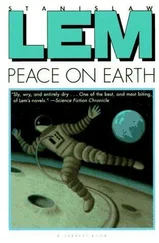When Donald and I returned to the hotel, he said at one point that he felt basically cheated: the leash on which we ran in circles had been lengthened, but that changed nothing in our situation of confinement. We were spectators at a nice display of intellectual fireworks, but when the show was over, we were left empty-handed. Perhaps — he went on — something had even been taken away from us. Before, the consensus omnium had stood behind the concept of a “letter” in whose envelope was found a little sand (meaning Frog Eggs). As long as we believed that we had received a letter, however incomprehensible it was, however mysterious, the knowledge of the existence of a Sender had value in itself. But now, when it turned out that perhaps the thing was not a letter but a meaningless scrawl, nothing remained to us except the sand. . and even if the sand was gold dust, we felt reduced to poverty — more, we felt robbed.
I thought this over when I was alone. I tried to figure out where the certainty in me came from which allowed me to dispose of other views, no matter how well buttressed by arguments they were. I was convinced that we had received a letter. It is very important to me to convey to the reader not just this belief of mine — the belief does not matter so much — but the reasoning behind it. If I fail here, I should not have written this book. For that was its goal. A man who, like myself, has grappled long and often, on many changing fronts of science, with the problems of solving “Nature’s ciphers,” truly knows more about them than you will find in his mathematically tidy publications.
On the authority of this unconveyable knowledge, I maintain that Frog Eggs, with its reservoir of nuclear energy, with its “tele-explosion” effect, should have been turned into a weapon under our hands, because we strove so very hard, and desperately, to do this. That we were unsuccessful can be no accident. We had succeeded — in other situations, which were “natural” — all too often. I have no difficulty imagining the beings who sent the signal. They said to themselves: We will make it undecipherable for all who are not yet ready; but we must go further in our caution — so that even a false reading will not be able to supply them with any of the things that they seek but that should be denied them.
Not atoms, not galaxies, and neither planets nor our own bodies has Anyone cordoned off with such a system of safeguards, and we bear all the dismal consequences of that Neglect. Science is the part of culture that rubs against the world. We scrabble out pieces from the world and consume them — not in the order that would be best for us, because No One was so kind as to arrange this, but in an order that is regulated only by the resistance that matter itself presents. The atoms and stars have no reasons; they cannot defy us when we fashion models in their image; they will not bar our way to knowledge that may possibly be lethal. Whatever exists outside man is like a corpse: it can possess no intention. But the moment the forces not of Nature but of Reason direct a message at us, the situation changes completely. The One who sent out the letter was motivated by a purpose that was definitely not indifferent to life.
From the first, what I feared the most was a misunderstanding. I was sure that we were not being sent an instrument of murder; but everything indicated that what we had received was the description of some instrument — and it is well known what use we put instruments to. Even man is a tool for man. Familiar with the history of science, I did not imagine that there was any perfect safeguard against abuse. All technologies were, after all, completely neutral, and we could assign to any one of them the goal of death. During that unimportant but desperate conspiracy — stupid, no doubt, yet by impulse inevitable — I believed that we could no longer count on Them, because They apparently had not been able to foresee what we might do with the information mistakenly. The safeguarding against what was planned and deliberate — that I could believe; but not against what constituted our error or our filling in the gaps with faulty substitutions. Even Nature herself, who for four billion years had instructed biological evolution in how to avoid “errors,” how to operate under the protection of all possible safety measures, could not keep an eye on life’s molecular slips and twists, its side streets, dead ends, and wrong turns, its “misunderstandings” — proof of which was the innumerable degenerations in the development of organisms, such as cancer. But if They succeeded, that meant that They had gone far beyond the perfection, unattainable for us, of biological systems. I did not know, however — how, indeed, was I to have known? — that Their systems, more effective than the biological, were so universally certain, so airtight: against trespass by the unqualified.
That night in the huge hall of the inverter, bending over the sheets of scrawled paper, I had felt a sudden weakness, a moment of dizziness, and it had grown dark before my eyes, not only because the dread hanging over my head for all those weeks unexpectedly melted away; but also because in that instant I experienced, palpably, Their greatness. I understood what a civilization could be based on, and what a civilization could be. We think of an ideal equilibrium, of ethical values, of rising above one’s own weakness, when we hear the word “civilization,” and we associate it with what is best in us. But it is, above all, knowledge, a knowledge that from the sphere of possible situations eliminates precisely those (common, for us) like this one: where the finest brains out of a billion beings address themselves to the task of sowing universal death, doing what they would rather not do and what they stand in opposition to, because there is no alternative for them. Suicide is no alternative. Would we have changed one bit the course of further research, the invasion of metal locusts from the sky, had the two of us killed ourselves? If They foresaw such situations, the only way that I can understand it is if at one time They were — or, who knows, perhaps still are — like us.
Did I not say at the beginning of this book that only a fundamentally evil creature knows what freedom it attains when it does good? There was a letter, it was sent, it fell to Earth, at our feet, and had been falling in a neutrino rain while the lizards of the Mesozoic plowed the mud of the Carboniferous forests with their bellies, while the paleopithecus, called Promethean, gnawed a bone and saw in it the first club. And Frog Eggs? In Frog Eggs I see fragments — distorted, caricatured by our ineptness and ignorance, but also by our knowledge, which is skewed toward destruction — fragments of what the letter provided for by its very delivery. I am convinced that it was not hurled into the darkness as a stone is into water. It was conceived as a voice whose echo would return — once it was heard and understood.
The by-product, so to speak, of a proper reception was to be a return signal, informing the Senders that contact had been established, and at the same time telling Them the place where this occurred. I can make only a vague guess as to the mechanism that was to do this. The energy autonomy of Frog Eggs, its ability to direct nuclear reactions upon itself, which served no purpose other than to continue the state that made this possible — is evidence, proof, of an error on our part, because in our further incursion we came upon an effect as mysterious as it was dramatic, able under completely different circumstances to liberate, focus, and hurl back into space an impulse of tremendous power. Yes, if the code had been read correctly, the TX effect, discovered by Donald Prothero, would have been revealed as a return signal, an answer directed at the Senders. What convinces me of this is its fundamental mechanism: an action traveling at the greatest cosmic speed, carrying energy of any magnitude across a distance of any magnitude. The energy, of course, is to serve the transmittal of information, and not destruction. The form in which TX made itself known to us was the result of a distortion that the knowledge recorded in the neutrino stream underwent during our synthesis. Error bred error — it could not be otherwise. This is only logical, yet I am still amazed by Their versatility, that could thwart even the potentially fatal consequence of mistakes — of more than mistakes, because ours was a premeditated effort to turn a ruined instrument into a deadly blade.
Читать дальше












